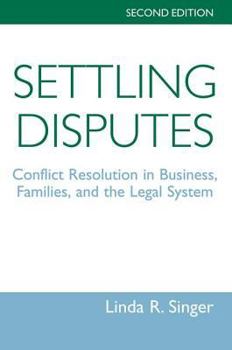Settling Disputes: Conflict Resolution in Business, Families, and the Legal System
Select Format
Select Condition 
Book Overview
Within the past few years, innovative methods have been developed not only to settle disputes out of court but also to supplement or replace the means by which legislatures, businesses, communities, therapists, and schools handle conflicts that once could be resolved only by litigation or force. Settling Disputes serves as an essential guide to the new settlement alternatives. This updated edition, in response to the rapid changes of the past five years, includes substantial new material that describes recent transformations in the way that courts and public agencies respond to disputes. The book discusses alternative dispute resolution from the viewpoints of potential participants and offers advice to those who are involved in disputes to help them analyze their situations and goals. Finally, it provides suggestions for professionals involved in dispute resolution and for those whose jobs in law, business, or government are affected by the new options for settling disputes.The dispute resolution movement continues to offer the most hopeful, powerful alternative to the business and personal costs of litigation or, worse, of violence. It has tremendous implications for the professional lives of Americans, for their private lives?as parents, spouses, neighbors, and consumers?and for their role as citizens.The first edition of Settling Disputes was awarded the 1990 Center for Public Resources Book Prize.
Format:Paperback
Language:English
ISBN:081338656X
ISBN13:9780813386560
Release Date:October 1994
Publisher:Routledge
Length:224 Pages
Weight:0.75 lbs.
Dimensions:0.6" x 6.0" x 8.9"
Customer Reviews
1 rating
Handy overview of ADR
Published by Thriftbooks.com User , 23 years ago
Alternative dispute resolution has enjoyed tremendous growth over the last couple of decades, and Linda Singer is as responsible for that growth as anyone. A longtime practitioner of ADR herself, she is eminently qualified to introduce the subject. In this handy volume, that is just what she does -- from the origins and growth of the field, to the various types of ADR, to the fields in which it is useful and the conditions under which it typically succeeds (or fails). Moreover, the 1994 edition is heavily revised and updated to include developments in the field since the book's original publication. Though not really a "how-to" book, the volume nevertheless contains useful insights into the nature of ADR practice and even excerpts from actual conflict-resolution sessions (for example a divorce mediation). Singer does not present ADR as a panacea for all the world's problems, but she does offer a very hopeful account of its broad and growing usefulness. Her discussion should be of interest to a wide range of readers with reason to care about alternatives to litigaton. For one thing, ADR is often less expensive in both time and money than adversarial litigation -- and even when it isn't, because the process leaves as much power as possible in the hands of the parties themselves, its solutions tend to be more inclusive of the participants' own real interests and more conducive to the genuine harmonization thereof. For another, ADR is a nice way to keep power out of the hands of political tyrants. As such, it should attract the attention not only of libertarians and classical liberals, but generally of anyone who is worried about the overgrowth of legislation and litigiousness here in the good ol' U.S. of A. As with certain topics in the common law, the value and importance of ADR is one subject on which political thinkers of almost all stripes should agree. There are lots of books out there about how to perform ADR. So far as I know, this is the only one that provides a principled historical introduction and overview. If you're interested in this subject, get this book.





